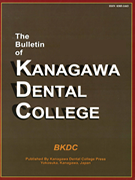- HOME
- > 一般の方
- > バックナンバー:The Bulletin of Kanagawa Dental College
- > 39巻2号
- > アブストラクト
アブストラクト(39巻2号:The Bulletin of Kanagawa Dental College)

English
| Title : | ROCK inhibitor stimulates secretion of CXCL14/BRAK and suppresses tumor formation of fibrosarecoma cells |
|---|---|
| Subtitle : | Selective Proceedings of 45th General Meeting of Kanagawa Odontological Society, 2010 |
| Authors : | Chihiro Miyamoto*1, Yojiro Maehata*1, Shigeyuki Ozawa*2, Takeharu Ikoma*2, Kazuhito Izukuri*3, Nobuyuki Yajima*3,*4, Fumiaki Tokutomi*1, Shuta Sugiyama*1, Ayaka Yoshida*1, Kyo Kobayashi*1, Fumihiko Yoshino*1, Satoko Takahashi*1, Shun-suke Takahashi*1, Ryu-ichiro Hata*3,*4, Masaichi-chang-il Lee*1 |
| Authors(kana) : | |
| Organization : | *1Department of Clinical Care Medicine, Division of Pharmacology and ESR Laboratories, *2Department of Oral Surgery, Kanagawa Dental College, *3Department of Biochemistry and Molecular Biology, Kanagawa Dental College, *4Oral Health Science Reserch Center, Kanagawa Dental College |
| Journal : | The Bulletin of Kanagawa Dental College |
| Volume : | 39 |
| Number : | 2 |
| Page : | 124-128 |
| Year/Month : | 2011 / 9 |
| Article : | Report |
| Publisher : | Kanagawa Odontological Society |
| Abstract : | [ABSTRACT] Ras-homologous small GTPase (RhoA) and Rho-associated coiled-coil-containing protein kinase (ROCK) are important regulators of the endocytic and exocytic trafficking of molecules in cells. Activation of this pathway stimulates tumor invasion and metastasis. Fasudil is a specific inhibitor of ROCK, which has been approved for the treatment of cerebral vasospasm. However, they have not been determined on tumor growth in vivo. We previously reported that CXCL14/BRAK (BRAK) has anti-tumor activity in several carcinoma cells, including human head and neck squamous cell carcinoma cells, but their mechanisms are still unclear. Here, we investigated the effects of fasudil on BRAK secretion and tumor growth in vivo. We developed stable cell lines, mouse fibrosarcoma, expressing BRAK (MC57-BRAK) and mock vector introduced (MC-57-MOCK), and examined the effects of fasudil on the secretion of BRAK by using ELISA in MC57-BRAK cells. The secretion of BRAK was significantly increased by treatment with fasudil in MC57-BRAK cells. In order to determine the effect of fasudil on tumor growth, MC57-BRAK and MC-57 MOCK cells were inoculated subcutaneously into both sides of the dorsolateral regions of 28 female mice. These mice were daily-administered fasudil, i.p. (50mg/kg/day). Fasudil suppressed the growth of tumors in mice that had received allografts of MC57-BRAK. These results indicate that fasudil inhibits tumor growth in the fibrosarcoma cells, and suggest that therapy using ROCK specific inhibitor such as a fasudil may have clinical efficacy through restoration of BRAK secretion. |
| Practice : | Dentistry |
| Keywords : | CXCL14/BRAK, RhoA-ROCK signaling pathway, Fibrosarcoma, fasudil |
